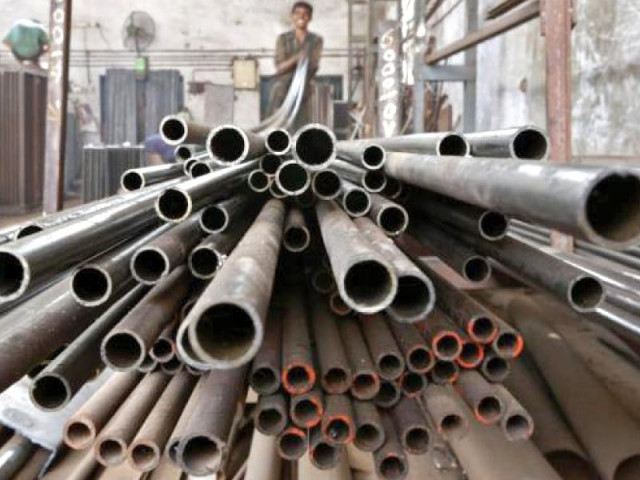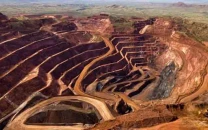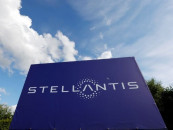Tuwairqi Steel warns: If gas doesn’t come cheap, company will pack up
It offers govt 15% stake in response to energy supply at a lower rate.

The top management of Saudi Arabia-based Al Tuwairqi Holding, while cautioning the government, has said that it will consider packing up if its steel mill in Pakistan is not provided promised gas at a discounted rate.
“Enough is enough, after one and a half years of bleeding, we don’t want to leave Pakistan, but when it comes to business, we have to act like a business,” said Dr Hilal Hussain Al-Tuwairqi, Chairman of Al Tuwairqi Holding, while speaking at a press conference here on Wednesday.
“If they don’t meet our demand, there is no way that we make investment here,” he said. “What you commit, you have to do.”
According to the management, the government has assured them that it will take up the matter in the upcoming meeting of the Economic Coordination Committee (ECC), but they could pull out of the country if the issue is not addressed.
In an effort to reach a settlement, the company has even offered 15% (126 million shares) in the steel mill to the government without any payment in response to gas supply at a concessionary rate. After 10 years, it is estimated that the share value would be Rs162.
The chairman said former prime ministers Shaukat Aziz, Yousaf Raza Gilani and Raja Pervaiz Ashraf had made the commitment, but when the prime minister of South Korea, whose steel giant has co-financed Tuwairqi Steel Mills, spoke to premier Nawaz Sharif, he got no response.
The ambassador of Saudi Arabia also discussed the matter with Finance Minister Ishaq Dar, but it produced no solution.
“If the Korean premier got no response, who will pay heed to me,” the chairman asked. “The government could say yes or no after a month; Al Tuwairqi has plans to make a further investment of $900 million in next phases.”
Replying to a question, he stressed that if they were denied cheaper gas supplies, they would take input and guidelines from legal advisers on what to do next.
The government, according to him, had also committed provision of water and power in a memorandum of understanding (MoU), but it did nothing. Al Tuwairqi has itself set up a power plant and laid a 19km pipeline.
He said Tuwairqi Steel Mills, which is Pakistan’s first private-sector integrated steel manufacturing project, would create 5,000 jobs in Balochistan and 3,000 jobs in Karachi. Tuwairqi Steel Country Head Zaigham Adil Rizvi said the steel complex would have a production capacity of 1.28 million tons per annum compared to Pakistan Steel Mills’ 1.1 million tons.
He pointed out that Pakistan Steel Mills was banking on imported coal and iron ore whereas Tuwairqi would rely entirely on the iron ore produced in Balochistan.
In May 2004, an MoU was signed with Pakistan, under which the government was to provide a level playing field in provision of gas as fuel and feedstock.
“It was promised that gas would be supplied at a lower tariff to enable the company to compete in the international market,” he said, adding the Ministry of Industries had recommended a tariff of Rs123 per million British thermal units for five years.
However, the Ministry of Petroleum and Natural Resources cautions that the financial impact of the reduced tariff on Sui Southern Gas Company will be about Rs5 billion, requiring a 3.3% increase in gas prices for all consumers, except for domestic and fertiliser sectors.
Tuwairqi Steel is a joint venture between Saudi Arabia’s Al Tuwairqi Group of Companies and South Korea’s Pohang Steel (Posco), who have planned to set up Pakistan’s largest steel complex.
On its part, the Ministry of Industries argues that though the mill is seeking a support of Rs4 to Rs5 billion per annum, its Direct Reduced Iron (DRI) plant will contribute to the country’s economy an estimated Rs12 billion. Apart from this, foreign investment worth Rs89 billion will be made in forward and backward linkages of the DRI plant.
After establishing the linkages, the ministry says, the mill will contribute Rs100 billion annually to the economy in import substitution.
Phase-I of the DRI plant has been completed with an investment of $340 million while capital injection in phase-II and III could be in the range of $850 to $900 million. This, however, has been linked with commercial success of the DRI plant.
Published in The Express Tribune, November 27th, 2014.
Like Business on Facebook, follow @TribuneBiz on Twitter to stay informed and join in the conversation.





1710175205-0/image-(9)1710175205-0-208x130.webp)













COMMENTS
Comments are moderated and generally will be posted if they are on-topic and not abusive.
For more information, please see our Comments FAQ